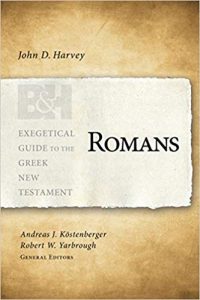 John D. Harvey (Th.D., Wycliffe College) is the Dean of the Seminary and School of Ministry at Columbia International University. He is also the author of the Romans commentary in the Exegetical Guide to the Greek New Testament series.
John D. Harvey (Th.D., Wycliffe College) is the Dean of the Seminary and School of Ministry at Columbia International University. He is also the author of the Romans commentary in the Exegetical Guide to the Greek New Testament series.
Dr. Harvey joined the faculty of CIU’s Seminary and School of Ministry in 1992 and taught New Testament and Greek until 2011. He has served as dean from 2011 until the present. He is a member of the Evangelical Theological Society, the Institute for Biblical Research, and the Society of Biblical Literature. He has had opportunities to teach in Germany, the Netherlands, Moldova, Zambia, and South Africa.
Dr. Harvey’s books include Interpreting the Pauline Letters and Anointed with the Spirit and Power. He is an ordained teaching elder in the Presbyterian Church in America.
7 Questions on Romans in the EGGNT Commentary Series
Recently, Dr. Harvey kindly answered my questions about his Romans commentary. Readers will learn how this commentary came to be, what is unique about it among Romans commentaries, and how the project edified him personally.
1. What previous research and/or personal interests led you to this project and helped prepare you to write this commentary?
My doctoral work focused on Paul’s letters. I have taught Romans (both Greek and English Bible) previously as well as New Testament Theology, which included a major section on Paul’s thought. I recently completed work on Interpreting the Pauline Letters in Kregel’s series, Handbooks for New Testament Exegesis.
2. Who is the intended audience for this commentary? Would it benefit pastors? professors? students? lay Christians in the local church?
As the General Introduction to the EGGNT series notes, the volume can serve a variety of readers, including students, pastors, and professors. It will be most helpful for readers who have at least some understanding of Greek grammar and syntax.
3. What is unique about this commentary? What contribution does it make to studies of Romans?
This volume is not a commentary in the strict sense of the word; it is an exegetical guide as the series title indicates. As such, it seeks to provide a comprehensive, in-depth guide to the grammar, syntax, and vocabulary of Romans. It also provides scholarly bibliography on important topics related to each paragraph of the letter as well as suggestions on how to move from text to sermon.
4. What section or passage of this commentary was particularly memorable to research and write? Why?
I found that working on the letter’s closing (15:14-16:27) was particularly enjoyable, including thinking through the significance of the extended greetings in chapter 16.—perhaps because I had not taken the time previously to work through it in detail.
5. What personally edified you in writing this commentary, increasing your affections for Christ?
Working through the text in detail and at length was an enriching experience, especially seeing the way in which Paul “unpacks” the richness of the gospel that is “God’s power for salvation to everyone who believes” (1:16).
6. Besides your commentary, what are your top recommended books (commentaries or otherwise) on Romans?
As the Introduction notes, Longenecker’s commentary explores the history of scholarship at some length; Schreiner’s commentary does a good job of discussing the overall argument of the letter; Moo’s commentary is helpful on exegetical details; Jewett’s commentary is helpful on the structure of each passage and on scholarly bibliography as a whole.
7. What is next for you? What project are you currently working on? How can people follow your work and ministry?
I hope to have an expository commentary on Romans submitted to the publisher by the end of 2017. It builds on the exegetical work of the EGGNT volume with a focus on communicating the message of the text. I would then like to take a similar approach either to Matthew’s Gospel or to Paul’s prison letters.
Own John D. Harvey’s Romans commentary
The link provided will direct you to this volume via it’s exact ISBN number:
- Get Dr. Harvey’s commentary on Romans at Amazon
- Get Dr. Harvey’s commentary on Romans on Christian Book Distributors
Recent Posts
David Jeremiah, a renowned pastor, author, and speaker, has captivated the hearts of many with his compelling sermons. His messages resonate deeply with diverse audiences, leaving an enduring...
Tim Keller, a distinguished pastor, theologian, and author, has garnered a devoted following through the profound impact of his sermons. In this article, we will explore seven compelling reasons...
